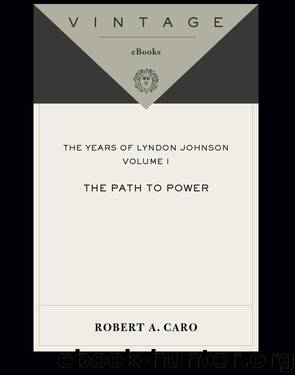The Path to Power by Robert A. Caro

Author:Robert A. Caro
Language: eng
Format: mobi, epub, azw3
ISBN: 9780307422576
Publisher: Knopf Doubleday Publishing Group
Published: 1982-01-27T10:00:00+00:00
IF MEN, even men who had long known Lyndon Johnson, now became aware of new dimensions of his “gift”—his ability not only to meet but move the public—they became aware also of new dimensions of the effort he would make in using that gift. The men who knew Lyndon Johnson best—who knew best how utterly unsparing of himself he was willing to be, how “hours made no difference, days made no difference, nights made no difference”—had felt at the start of the campaign that, as Gene Latimer put it, “No matter what anyone said, we felt he had a chance, because we knew he would work harder than anyone else.” But even these men had not known how hard he would work.
Very few of the local influentials, the “lead men,” were for him. The leaders in the four counties in which Harris had been District Attorney knew Harris; the leaders in the counties Brownlee represented in the Legislature knew Brownlee; the leaders in Williamson County knew Sam Stone; leaders throughout the entire district, because they had needed favors from Buchanan, knew Buchanan’s man Avery—when Johnson visited them, they were courteous to him, but they also let him know quite clearly that their allegiances, forged over many years, were not transferable to a stranger, particularly not to some young—too young—stranger who thought he should be a Congressman.
But he didn’t stop visiting them. In Brenham, for example, he was, as Keach puts it, “working on an old Judge”—Sam D. W. Low. “His house sat on a knoll,” and the Judge sat on the porch. After calling on Low, Johnson would come back to the car, and say, “Boy, I don’t know. That was a tough cookie. Well, I tried, anyway.” He kept trying. Low told Johnson he was for Avery, and was going to stay for Avery, “but,” Keach says, “he [Johnson] kept going back. Many times I sat down on the road in the car watching him take the long walk up that trail to the house where the Judge was sitting on the porch.”
“He kept going back” even to the one leader who did not, in dealing with Johnson, observe the tradition of courtesy: Austin’s beefy Mayor Miller, an arrogant, hot-tempered man who had taken an instant and deep dislike to Johnson. Johnson humbled himself before him; returning to Austin after a day’s campaigning, he would sometimes tell Keach to drive by the Mayor’s big house on Niles Road; if Miller’s car was parked there, indicating that the Mayor was home, he would ring the doorbell and ask if he could come inside for a talk. Miller never wavered in his views, but Johnson never stopped dropping by.
One “lead man” who was for him (because his daughter was married to Johnson aide Ray Lee) was County Judge Will Burnet of Hays County. But Hays looked bad for Johnson nonetheless: the county was the site of San Marcos—and of Johnson’s alma mater, Southwest Texas State Teachers College. As the Austin American
Download
The Path to Power by Robert A. Caro.epub
The Path to Power by Robert A. Caro.azw3
This site does not store any files on its server. We only index and link to content provided by other sites. Please contact the content providers to delete copyright contents if any and email us, we'll remove relevant links or contents immediately.
| American Revolution | Civil War |
| US Presidents |
Fanny Burney by Claire Harman(25789)
Empire of the Sikhs by Patwant Singh(22176)
Out of India by Michael Foss(16313)
Leonardo da Vinci by Walter Isaacson(11912)
Small Great Things by Jodi Picoult(6102)
The Six Wives Of Henry VIII (WOMEN IN HISTORY) by Fraser Antonia(4796)
The Wind in My Hair by Masih Alinejad(4427)
The Lonely City by Olivia Laing(4122)
The Crown by Robert Lacey(4110)
A Higher Loyalty: Truth, Lies, and Leadership by James Comey(4038)
The Iron Duke by The Iron Duke(3642)
Millionaire: The Philanderer, Gambler, and Duelist Who Invented Modern Finance by Janet Gleeson(3574)
Sticky Fingers by Joe Hagan(3456)
Alive: The Story of the Andes Survivors by Piers Paul Read(3317)
Papillon (English) by Henri Charrière(3275)
Joan of Arc by Mary Gordon(3262)
Stalin by Stephen Kotkin(3089)
Aleister Crowley: The Biography by Tobias Churton(3024)
Ants Among Elephants by Sujatha Gidla(2927)
